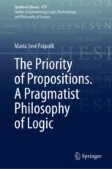Search
Search Results
-
From Epistemic Norms to Logical Rules: Epistemic Models for Logical Expressivists
In this paper I construct a system of semantics for classical and intuitionistic propositional logic based on epistemic norms governing belief...
-
Relevant entailment and logical ground
According to an intuitive picture of relevant entailment, an entailment is relevant if all the formulas it contains contribute to its validity. In...

-
Logical Multilateralism
In this paper we will consider the existing notions of bilateralism in the context of proof-theoretic semantics and propose, based on our...
-
The Inference-Marker View of Logical Notions: What a Pragmatist Proposal Looks Like
In this chapter, I discuss an informed pragmatist proposal for characterising the class of logical constants, which I call ‘the inference-marker...
-
Ground first: against the proof-theoretic definition of ground
This paper evaluates the proof-theoretic definition of ground developed by Poggiolesi in a range of recent publications and argues that her proposed...

-
Logical abductivism on abductive logic
Logical abductivism is the epistemic view about logic according to which logical theories are justified by abduction (or Inference to the Best...
-
A Logical Study of Moral Responsibility
This paper proposes a logical framework for studying the structure of moral responsibility for outcomes. The analysis incorporates two vital...

-
A Logical Analysis of Instrumentality Judgments: Means-End Relations in the Context of Experience and Expectations
This article proposes the use of temporal logic for an analysis of instrumentality inspired by the work of G.H. von Wright. The first part of the...
-
Spirituality: Definition, Religion and Ethics
Workplace spirituality continues to receive attention, with research on ethical outcomes and other sorts of outcomes. The research has shown mixed...
-
Should Theories of Logical Validity Self-Apply?
Some philosophers argue that a theory of logical validity should not interpret its own language, because a Russellian argument shows that...
-
Implying, Precluding, and Quantifying Over: Frege’s Logical Expressivism
There are 16 bivalent binary truth functions, but only two fundamental logical relations between propositions: implying and precluding. In addition,...
-
Logical Inference
This book is about mathematical logic, but so far the discussion has focused only on first-order logic as a formal language in which properties of...
-
Logics of Order and Related Notions
The aim of the paper is twofold. First, we want to recapture the genesis of the logics of order. The origin of this notion is traced back to the work...
-
A Logical Modeling of Severe Ignorance
In the logical context, ignorance is traditionally defined recurring to epistemic logic. In particular, ignorance is essentially interpreted as “lack...
-
Fragmentation, metalinguistic ignorance, and logical omniscience
To reconcile the standard possible worlds model of knowledge with the intuition that ordinary agents fall far short of logical omniscience, a...
-
The Compound Notions for Logical and Shannon Entropies
In this chapter, all the compound notions of simple, joint, conditional, and mutual logical entropy are defined and then the corresponding notions of...
-
Time and Some Temporal Notions: A Vaiśeşika Analysis
Vaiśeşikas are realist philosophers of classical India. They admit time ( kāla ) as a ubiquitous real substance. In this paper, our aim is to discuss...
-
Reversing logical nihilism
Gillian Russell has recently proposed counterexamples to such elementary argument forms as Conjunction Introduction (e.g. ‘Snow is white. Grass is...
-
Anti-exceptionalism and the justification of basic logical principles
Anti-exceptionalism about logic is the thesis that logic is not special. In this paper, I consider, and reject, a challenge to this thesis. According...
-
A logical challenge to correlationism: the Church–Fitch paradox in Husserl’s account of fulfilment, truth, and meaning
Husserl’s theory of fulfilment conceives of empty acts, such as symbolic thought, and fulfilling acts, such as sensory perceptions, in a strict...

